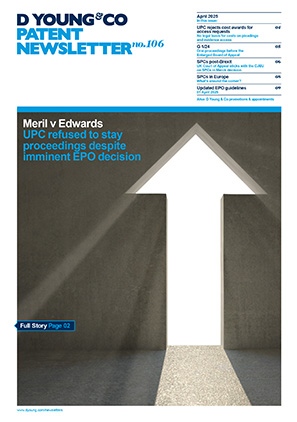EPO patent assignment recordal: signatures & evidence
The EPO’s approach to assignment recordal has changed over the last two years. At D Young & Co we have seen that the new approach has required applicants to provide more detailed documentation in support of their request which often results in the recordal taking longer than expected.
The main requirements for an assignment recordal have not changed. Article 72 EPC states: “An assignment of a European patent application shall be made in writing and shall require the signature of the parties to the contract”.
Whilst this legal basis has not changed, the level of evidence the EPO now requires has.
Previously the EPO was happy to accept evidence that both parties agreed to the transfer, for example by having the assignor sign the assignment and the assignee request the relevant recordal at the EPO, however this is no longer the case. Assignments for recordal at the EPO are now expected to be in writing and signed by all parties to ensure that they meet the requirements of Article 72 EPC.
The Guidelines for Examination, which came into force on 01 November 2016, confirmed that the signatures of the parties (that is, the assignor and the assignee) must appear on the documents submitted as evidence of the transfer and also stated that a signatory signing on behalf of a corporate owner must give their precise job title.
The latest version of the Guidelines for Examination, which came into force on 01 November 2017, went further and states: “Where a document is signed on behalf of a legal person, only such persons as are entitled to sign by law, by the legal person’s articles of association or equivalent or by a special mandate may do so. National law applies in that respect. In all cases, an indication of the signatory’s entitlement to sign, for example his/her position within the legal entity where the entitlement to sign results directly from such a position, is to be given. The EPO reserves the right to request documentary proof of the signatory’s authority to sign if the circumstances of a particular case necessitate this. Where the entitlement results from a special authorisation, this authorisation (a copy thereof, which need not be certified) has to be submitted in every case. The EPO will in particular examine whether the signatory is empowered to enter into a legally binding contract on behalf of the legal entity.” (GL E XIV 3) (emphasis added).
Whilst this indicates that proof of a signatory’s authority to sign such documents might be requested in exceptional cases, at D Young & Co we have noted that this is being requested as standard, unless the relevant signatory is a director, president or CEO of the relevant company. Our discussions with the officers at the EPO have revealed that this is indeed the case, and that proof of authority for any signatory who is not a director, president or CEO of the relevant company is required.
We have also been informed that such proof of authority should state that the relevant signatory has authority to sign legally binding documents, in particular in relation to the assignment or transfer of patents and patent applications, on behalf of the company.
Whilst we have been able to obtain this guidance from the EPO, an explanation as to why this degree of evidence is now required has not been forthcoming. In any event this new approach is now the standard to which applicants must adhere when requesting recordal of an assignment or transfer at the EPO.
Recommendations
In light of the EPO’s new stricter approach, and from the experience of our various attorneys in recording assignments over the past two years, we recommend the following actions:
- Ensure any assignment that might be recorded at the EPO is signed by all parties.
- Ensure the job titles of the signatories are listed on the assignment.
- If the job title of any signatory is not director, CEO or president of the company (or company secretary for US companies), provide proof of authority for that signatory.
- The proof of authority should state that the signatory is authorised to sign legally binding documents on behalf of the company (in particular relating to the transfer or assignment of patents and patent applications).
- The proof of authority could be in the form of a specific document signed by a director, CEO or president of the company, an extract from the relevant commercial register or minutes from a board meeting.
It is hoped that by following these recommendations a request for recordal of assignment at the EPO will be swiftly approved and excessive delays avoided.
Applicants considering filing a request for recordal of assignment should contact their usual D Young & Co patent attorney who will be happy to advise as to whether your documentation will meet the EPO’s new requirements and any further steps that should be taken.
